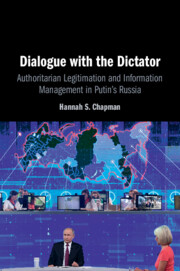
-
Select format
-
- Publisher:
- Cambridge University Press
- Publication date:
- February 2024
- February 2024
- ISBN:
- 9781009427548
- 9781009427524
- 9781009427579
- Dimensions:
- (229 x 152 mm)
- Weight & Pages:
- 0.55kg, 270 Pages
- Dimensions:
- (229 x 152 mm)
- Weight & Pages:
- 0.4kg, 270 Pages
You may already have access via personal or institutional login
Book description
Dialogue with the Dictator illuminates the ways in which authoritarian regimes structure interaction between citizens and leaders to simultaneously manage information dilemmas and build regime legitimacy. In doing so, it demonstrates the conditions under which managed participation can reinforce or jeopardize authoritarian control. Chapters uncover how these tools are viewed from the perspective of the public and the mechanisms through which they influence attitudes toward authorities. By cultivating limited opportunities for participation in otherwise closed political systems, autocrats bolster regime legitimacy while still maintaining control of the means and content of communication. These tools ultimately reinforce and entrench autocratic leaders rather than contributing to increased prospects for democracy – but not without consequences. Combining interviews, original surveys, and text analysis, the book provides a novel theoretical framework for understanding managed participation under authoritarianism and explains both its benefits and potential consequences for authoritarian regimes.
Reviews
‘Dialogue with the Dictator breaks new ground by exploring how the Kremlin governs not only by coercion, but also by using limited opportunities for participation to gain public support. By identifying the power and limits of ‘participatory technologies’ such as a popular call-in show with President Putin, Chapman makes a much-needed contribution to our understanding of modern autocracy.’
Tim Frye - Marshall D. Shulman Professor of Post-Soviet Politics, Columbia University
‘Dialogue with the Dictator shows how participatory technologies foster elite-enabling participation by generating public support and legitimacy without constraining elite behavior. Chapman’s theory of participatory technologies reveals how seemingly democratic institutions are manipulated in authoritarian regimes to manufacture consent. While Putin’s Russia is the main case, the theory is relevant to all non-democracies.’
Danielle Lussier - Associate Professor of Political Science, Grinnell College
‘In Dialogue with the Dictator, Hannah Chapman presents an innovative framework to make sense of how autocrats utilize the tools of participatory democracy to consolidate authoritarian control. Whereas most scholars of participatory institutions examine the potential of these venues to deepen democracy, Chapman’s ground-breaking analysis reveals the power of participatory technologies to entrench authoritarian regimes by controlling flows of information and bolstering their legitimacy. Dialogue with the Dictator is a must-read for scholars of authoritarianism, political communication, and participatory institutions.’
Lindsay Mayka - Associate Professor of Government and Chair of Latin American Studies, Colby College
‘Most authoritarian regimes today embrace tools that allow citizens to participate in politics. Hannah Chapman gives us the most thorough account to date of why regimes use public participation and to what effect. Through a detailed analysis of Putin’s ‘Direct Line,’ she shows how these institutions can boost regime support even when they do not necessarily beget better governance. This book is political science at its best, a must-read for anyone interested in how authoritarian regimes foster legitimacy.’
‘Recommended.’
P. Rutland Source: Choice
‘[A]n ambitious and comprehensive book that makes a significant contribution to our understanding of contemporary autocracies. By illuminating how and why non-democratic regimes use seemingly democratic practices to entrench their control over society, it helps explain the autocrats’ resilience. … the theoretical framework and empirical findings offer valuable lessons for making sense of authoritarian governance around the world. Chapman’s insights are particularly pertinent for our digital age, as autocrats adapt new technologies to the enduring problem of maintaining their hold on power.’
Dima Kortukov Source: Europe-Asia Studies
Contents
Metrics
Altmetric attention score
Full text views
Full text views help Loading metrics...
Loading metrics...
* Views captured on Cambridge Core between #date#. This data will be updated every 24 hours.
Usage data cannot currently be displayed.
Accessibility standard: Unknown
Why this information is here
This section outlines the accessibility features of this content - including support for screen readers, full keyboard navigation and high-contrast display options. This may not be relevant for you.
Accessibility Information
Accessibility compliance for the PDF of this book is currently unknown and may be updated in the future.


